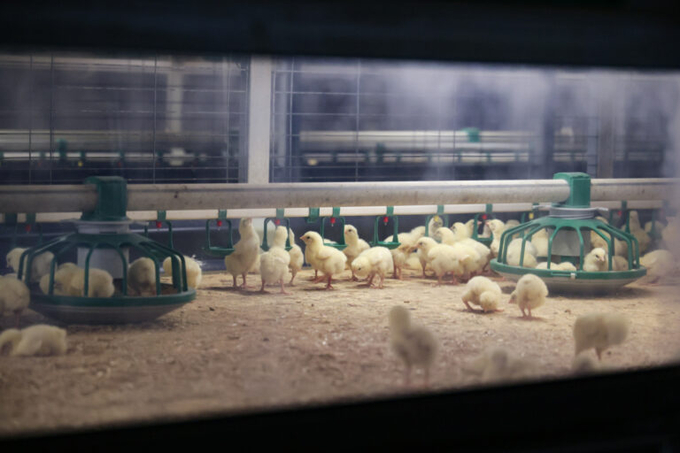May 22, 2025 | 04:39 GMT +7
May 22, 2025 | 04:39 GMT +7
Hotline: 0913.378.918
May 22, 2025 | 04:39 GMT +7
Hotline: 0913.378.918

Several of Canada’s most-prominent poultry researchers are launching new projects span topics including avian influenza, embryo and chick activity, and antibiotic alternatives. Photo: Marcel Rob.
These projects, all based at University of Guelph in Ontario, span a wide range of areas, including avian influenza, embryo and chick activity, antibiotic alternatives, feed additives and disinfection of eggs at hatcheries.
Dr Shayan Sharif will study how to reduce the spread of avian influenza in the face of a changing climate. Sharif will also conduct a separate project with Dr Joshua Gong at Agriculture and Agri-food Canada (AAFC) to explore whether certain bacteria may help control chicken diseases by blocking cell-to-cell communication that fuels intestinal disease development.
Some chicken embryos kick their legs and move their wings more than others, but we don’t know why – nor whether this leads to better physical development post-hatch. Dr Alexandra Harlander, one of Canada’s most-prominent poultry behaviour and welfare scientists, is tackling these questions. She will also investigate with colleagues whether, in cage-free housing, training chicks or allowing them to learn by observing and interacting with older birds can enhance their physical development and/or navigation of the barn environment.
As the search continues for ways to decrease or eliminate antibiotics, Dr Nicole Ricker will explore the use of bacteriophages (viruses that can only infect bacterial cells), administered alone or with gut-modifying feeds, can be used as potential alternatives to antibiotics for battling Salmonella infections in poultry. Ricker will work in collaboration with Dr Hany Anany at AAFC.
With his new funding, Dr Elijah Kiarie will work with AAFC colleagues to evaluate fruit pomaces (by-products from fruit processing that include skin, pulp, seeds, stems) as potential feed ingredients to enhance bird health, performance and food safety. Kiarie is also receiving new funding to measure the amounts of nitrogen-containing gases produced by chickens in broiler houses and develop strategies to reduce these outputs, as well as nutrient losses. This is accomplished by designing feed formulas that optimise protein utilisation.
Biochar has been studied in Canada for many years for use as a soil amendment and more. It’s a carbon-rich, petroleum-free material produced by pyrolysis (heating materials in the absence of oxygen). Dr Animesh Dutta, engineering professor and founding director of the Bio-Renewable Innovation Lab, will develop a thermochemical process for generating biochar from poultry litter.
Dutta will also work in collaboration with scientists at AAFC and McGill to study how climate change impacts the gut health of poultry and explore innovative uses for valuable compounds found in litter.
Disinfection of eggs in hatcheries can be done in different ways. Food science researcher Dr Keith Warriner has received funding to explore the use of antimicrobial gas-phase hydroxyl radicals for cleaning not just eggs but also egg crates, trays and other surfaces in the hatchery.
(Poultryworld)
![Reducing emissions from rice fields: [2] Farmers’ commitment to the soil](https://t.ex-cdn.com/nongnghiepmoitruong.vn/608w/files/news/2025/05/05/dsc08881jpg-nongnghiep-140632.jpg)
(VAN) Clean rice cultivation model in Thuong Tan commune, Bac Tan Uyen district, is assisting local residents in achieving sustainable agriculture by substantially reducing costs, increasing productivity, and protecting the environment.

(VAN) At the conference to disseminate Resolution No. 68, AgriS introduced its digital agricultural ecosystem and reaffirmed its commitment to accompanying the Government in promoting private sector development and sustainable agriculture.

(VAN) 'Blue Ocean - Blue Foods' initiative is designed to restore marine ecosystems and establish sustainable livelihoods for local communities by cultivating a minimum of 1,000 hectares of cottonii seaweed in the first three years.
/2025/05/21/4642-3-112707_603.jpg)
(VAN) The V-SCOPE project has made direct contributions to three out of six pillars of the Comprehensive Strategic Partnership between Vietnam and Australia.

(VAN) Facing the threat of rabies spreading to the community, Gia Lai province urgently carries out measures to vaccinate dogs and cats on a large scale.

(VAN) Disease-free livestock farming not only protects livestock herds but also stabilizes production and livelihoods for many farmers in Tuyen Quang.

(VAN) Japan's grant aid project contributes to capacity building, promoting organic agricultural production, and fostering sustainable community development in Dong Thap province.